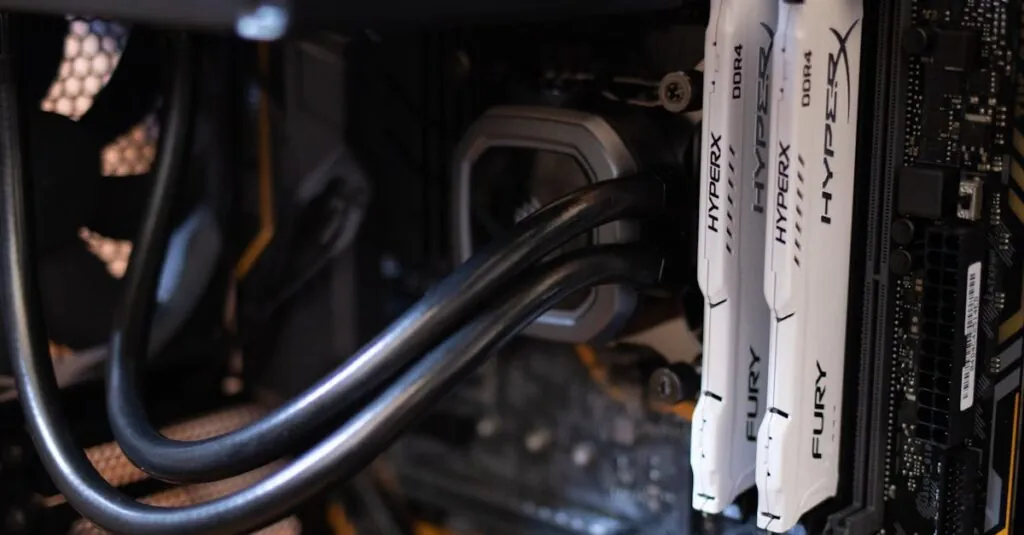Building good habits can feel like trying to teach a cat to fetch—frustrating and often futile. Yet, with the right habit system setup, anyone can turn those pesky routines into a well-oiled machine. Imagine waking up each day with the confidence of a superhero, knowing your habits are working for you instead of against you.
Table of Contents
ToggleUnderstanding Habit System Setup
Habit system setup involves strategies that streamline daily actions into cohesive routines. This process can improve productivity and enhance goal achievement.
Definition of Habit System
A habit system refers to an organized framework for establishing and maintaining habits. This system encompasses specific cues, routines, and rewards that reinforce desired behaviors. Cues trigger actions, while routines detail the behaviors that follow. Rewards provide motivation and satisfaction, solidifying these habits over time. By integrating various components, individuals create a manageable environment that promotes consistency in their daily lives.
Importance of Habit System Setup
Setting up a habit system holds significant value in personal development. Effective habits contribute to better decision-making and a more focused mindset. An organized habit framework enables individuals to replace negative behaviors with positive ones. Consistently practicing habits reduces cognitive load, allowing for seamless daily execution. Habit systems create a sense of accountability and track progress, ensuring individuals remain motivated toward their goals. Ultimately, intentional setup fosters a supportive internal environment that champions growth and success.
Key Components of Habit System Setup
Effective habit systems hinge on several key components that enhance daily routines and support personal goals.
Goal Setting
Setting clear and achievable goals serves as a foundation for habit development. Defining specific, measurable, attainable, relevant, and time-bound objectives provides direction. Individuals find it helpful to break down larger goals into smaller milestones. This incremental approach keeps motivation high and progress visible. For example, aiming to read 12 books in a year translates to one book per month. Sharing these goals with others can also create a sense of accountability, reinforcing commitment to the desired outcome.
Habit Tracking
Tracking habits fosters awareness and accountability. Utilizing tools like journals or mobile apps allows individuals to monitor progress daily. Consistently recording achievements provides insights into which habits flourish and which ones need adjustment. Implementing visual cues, such as charts, can enhance motivation. For instance, seeing a streak of successful days encourages continued effort. Habit tracking also identifies patterns and potential obstacles, making it easier to strategize for improvement.
Environmental Cues
Creating an environment conducive to desired habits plays a significant role in habit success. Identifying specific cues encourages individuals to engage in positive behaviors more regularly. For example, placing running shoes by the door signals a reminder to exercise. Additionally, decluttering workspaces can enhance focus and productivity. Consistency in the arrangement of environmental cues ensures automatic responses to habits. Adjusting surroundings to minimize distractions reinforces commitment and supports sustaining habits over time.
Steps to Create an Effective Habit System
Creating an effective habit system involves several key steps that lead to lasting change. A systematic approach promotes consistent behavior and progress in various areas of life.
Identifying Desired Habits
Identifying desired habits serves as the first step. Begin by reflecting on personal goals and values. Individuals can list specific areas for improvement, such as health, productivity, or relationships. Recognizing patterns in behavior helps in selecting habits that will create meaningful change. Focusing on a few important habits reduces overwhelm and increases the chance of success.
Developing a Routine
Developing a routine solidifies habits into daily practice. Establish specific times for each habit to enhance consistency. Using tools like calendars or habit-tracking apps can support this process. Individuals might consider pairing desired habits with existing routines, making them easier to integrate. Emphasizing small, achievable steps fosters incremental progress, enabling individuals to build confidence and momentum.
Evaluating Progress
Evaluating progress ensures that the habit system remains effective. Regularly reviewing achievements helps maintain motivation and accountability. Individuals can assess habit completion through journals or apps, noting successes and challenges. Gathering feedback allows for adjustments to the system as necessary. Recognizing milestones reinforces commitment, ensuring that individuals stay focused on their goals.
Common Challenges in Habit System Setup
Establishing a habit system comes with various challenges. Individuals often face obstacles that can hinder their progress.
Overcoming Procrastination
Procrastination often undermines habit formation. Break tasks into smaller steps, making them more manageable. Each small achievement builds momentum, encouraging continued effort. Setting specific deadlines can create a sense of urgency. Prioritizing these deadlines helps mitigate the tendency to delay actions. Utilizing tools like timers promotes focused work sessions, enhancing productivity. Finding accountability partners also fosters commitment, providing external motivation.
Managing Setbacks
Setbacks are a natural part of any habit-building journey. Accepting that mistakes happen reduces frustration and allows for a more flexible approach. Analyzing the causes of setbacks provides insights for future prevention. Individuals can implement adjustments based on these evaluations. Reframing setbacks as learning opportunities encourages resilience. Creating a recovery plan serves as a safety net during challenging times. It allows individuals to get back on track more swiftly while maintaining focus on long-term goals.
Staying Motivated
Sustaining motivation often proves difficult over time. Crafting a vision board with visual reminders of goals can inspire daily action. Celebrating small victories reinforces positive behavior, fostering a sense of accomplishment. Establishing a routine can anchor habits, creating familiarity and ease. Incorporating variety into routines keeps them fresh and engaging. Additionally, regularly reviewing progress offers insight into accomplishments and areas for improvement. Staying connected to one’s ‘why’ strengthens motivation, continuously aligning actions with personal values.
Establishing a habit system is a powerful way to enhance productivity and personal growth. By creating a structured approach that incorporates clear goals and consistent routines, individuals can effectively replace negative behaviors with positive ones.
This intentional setup not only simplifies daily actions but also fosters accountability and motivation. As individuals track their progress and adjust their systems, they cultivate resilience against setbacks and procrastination.
With the right strategies in place, anyone can transform their habits into supportive tools that lead to lasting success and fulfillment. Embracing this journey empowers individuals to align their daily actions with their long-term aspirations.









